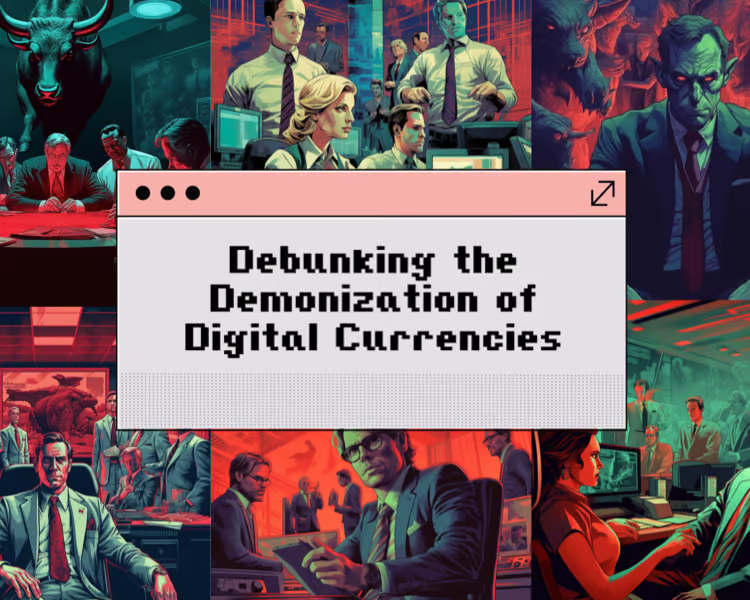Welcome Cyborgs,
Have you ever asked yourself why such a potentially transformative technology like cryptocurrencies are often cloaked in negativity and fear?
Why is it that the narrative surrounding Bitcoin, the spearhead of this digital revolution, is riddled with cautionary tales, painting a picture of an unstable, dangerous frontier?
I. Debunking the Demonization of Digital Currencies
This narrative, brimming with fear and doubt, has fostered a public perception that is at best wary, and at worst, outright hostile.
As the media focuses on volatility and illicit use, the truly disruptive potential of Bitcoin is overshadowed.
Is this portrayal accidental, or a calculated response to the threat Bitcoin poses to established systems?
Moreover, have you ever noticed that despite many politicians admitting their limited understanding of the underlying technology, they are often at the forefront of the anti-crypto brigade?
Could their vitriol be a response to the inevitable disruption that Bitcoin brings to their power structure?
As Cyborgs, we have made it our mission to challenge these misconceptions.
Our goal is to equip you with the truth about cryptocurrencies, to dissect the fears and understand the potential.

Together, we will uncover the layers of misunderstanding, challenging the negative discourse and setting the stage for a balanced and informed conversation about Bitcoin and its siblings in the cryptocurrency world.
The Prevailing Perception of Bitcoin and Cryptocurrencies
When we examine the discourse surrounding Bitcoin and other cryptocurrencies, we often find it leaning towards the negative.
Mainstream media tends to spotlight instances of price volatility, alleged association with illicit activities, and the perceived lack of regulation, thus advising caution when approaching this digital frontier.
While not entirely without basis, these narratives offer a skewed view of the crypto landscape.
They underscore the risks and potential pitfalls while overshadowing the immense potential and benefits that these technologies harbor.
This selective storytelling fosters an atmosphere of fear, uncertainty, and doubt, a phenomenon known in the crypto world as “FUD.”
The Core Focus: Untangling Misconceptions About Bitcoin

In this edition, we aim to challenge the FUD and dismantle the misconceptions encircling Bitcoin and other digital currencies.
It’s high time we sifted through the sensationalist headlines and alarmist rhetoric to unveil the truth.
Despite its volatility and regulatory challenges, Bitcoin is not a symbol of financial chaos but rather a beacon of financial freedom.
Our mission is to illuminate the truth, to inspire, and to empower each one of you to seize control of your financial destiny in this new digital era.
So, fasten your seatbelts as we delve deep into the future of finance. It’s time we embraced it with understanding and open minds.
II. The True Threat of Bitcoin to Established Institutions
In every society, the power balance is a delicate equilibrium, carefully preserved and defended by those at its helm.
This is no different in our world of economics and finance, where power equates to wealth and influence.
Fear as a Means of Control
Fear is a powerful manipulator.
When wielded strategically, it can shape narratives and influence public perception.
Cryptocurrencies, with their disruptive potential, are perceived as a threat to the status quo.
This ensuing fear is leveraged by governments worldwide to manipulate public opinion against these nascent technologies.
For governments, the unnerving idea isn’t the technology itself but the potential shift in power dynamics it represents.

Decentralized and uncontrolled, Bitcoin and its brethren could democratize wealth distribution, undermine the monopoly of traditional financial institutions, and ultimately challenge governmental authority.
The Illusion of Democracy in Finance
In a genuine democracy, power stems from the people.
However, our modern systems often project an illusion of democracy. Behind the scenes, massive wealth and influence frequently sway legislative outcomes through lobbying, substantial donations, and other means.
This illusion is particularly stark in the financial realm.
Consider the stock market, hailed as a pillar of free economy, yet inherently exclusionary.
A privileged few enjoy access to after-hours trading, participate in initial public offerings (IPOs), and maneuver through the rigid rules of day trading.

This exclusion is far from accidental.
It’s a deliberate design to maintain the status quo, prevent upward mobility, and preserve socio-economic stratification.
In stark contrast, Bitcoin and cryptocurrencies promise an inclusive financial system, where wealth is not a prerequisite for participation.
Wealth Redistribution: Cryptocurrencies as Equalizers
A narrative often associated with Bitcoin and cryptocurrencies is their potential to cause financial instability and wealth destruction.
However, this narrative obscures the bigger picture: wealth redistribution.
Today, a minuscule fraction of individuals control the majority of the world’s wealth.
This extreme wealth concentration is not just an economic concern, but also a socio-political issue.
Bitcoin and other cryptocurrencies, with their potential to democratize financial systems and grant financial autonomy to the masses, pose a threat to this imbalanced status quo.

This is not a call to arms against the wealthy, but rather a call to question the systems perpetuating these imbalances.
It’s a call to envision a more equitable world, where economic power isn’t concentrated in the hands of a few.
Short-Termism in Policy Making
Our political system, propelled by short-term electoral cycles, often falls short of planning for the future.
Policy-making is frequently reactive, focused on patching problems rather than pursuing sustainable solutions.
This short-term approach extends to our financial laws as well, with policy-makers often introducing regulations that serve as band-aids rather than systemic improvements.
Here, Bitcoin and cryptocurrencies can make a difference.
Blockchain technology, the bedrock of Bitcoin, enables the creation of decentralized autonomous organizations (DAOs).
These entities operate based on pre-set rules, free from the whims and uncertainties of short-term political cycles.
III. Revealing the True Concerns Behind Governments’ Fear of Bitcoin
Having journeyed through the essence of cryptocurrencies and the potential threats they pose to established institutions, we arrive at a critical juncture – the crux of the matter.
Our aim is to peel back the curtain and expose the genuine apprehensions that governments harbor about Bitcoin and cryptocurrencies.
1. Erosion of Monetary Control: The Decentralization Revolution
Cryptocurrencies, by their very nature, pose a threat to the centralized control that governments wield over monetary systems.
Instead of a select few determining the fate of an entire nation’s economy, power is distributed across a global network of participants.

It’s a remarkable shift from control by the few to empowerment for the many.
2. Threat to Fiat Currency: A Rising Phoenix
Cryptocurrencies are more than just an alternative form of digital money; they represent a radical paradigm shift away from traditional fiat currencies.
What makes this shift so daunting to governments is the disruption of their long-held control over the money supply.
Historically, nations could print more money or manipulate the money supply at their discretion.
Cryptocurrencies, particularly Bitcoin, challenge this monopoly.
With a predetermined supply and transparent rules, Bitcoin strips governments of their traditional power to control inflation and manipulate economic conditions.
3. Evasion of Economic Sanctions: Decentralization at Work
Cryptocurrencies could potentially enable nations under economic sanctions to circumvent these restrictions, a prospect that unsettles many governments.
However, the same technology could also assist nations suffering under unjust sanctions, thereby fostering a more equitable global economic order.
4. Challenges in Taxation: Tackling Outdated Systems
With the advent of cryptocurrencies, the cracks in our existing, complex taxation systems are becoming more apparent.
These systems, underpinned by archaic laws and lobbied to maintain their complexity by companies such as TurboTax, struggle to adapt to the new digital currency landscape.

Cryptocurrencies are nudging governments to rethink and innovate their taxation laws.
However, the transformation is slow due to the entrenched interests of industries that profit from the existing complexity.
But remember, this isn’t about tax evasion, but about advocating for the necessary modernization of our taxation system.
We are nudging towards an era of transparency and simplicity, catalyzed by the rise of cryptocurrencies.
5. Potential for Illicit Use: A Question of Perspective
Every innovation can be exploited for illicit activities, and cryptocurrencies are no exception.
However, zeroing in on this aspect alone is akin to blaming cash for its use in illegal activities, while ignoring its role as a daily medium of exchange for billions of people.
6. Threat to Sovereignty: The Double-Edged Sword
The idea of a currency not tied to a specific country may seem like a threat to national sovereignty.

However, this perspective fails to acknowledge the potential benefits that such a global, decentralized currency could bring, such as reducing dependence on volatile foreign exchange markets and fostering a more interconnected global economy.
VI. The Transformational Power of Decentralized Finance
Decentralized Finance, or DeFi as it is commonly known, is an arena that threatens to unsettle the traditional banking system while bringing about financial democracy and inclusivity.
The DeFi Revolution: A Threat to Traditional Banking
For centuries, financial transactions have been routed through an intricate system of banks and financial institutions, designed with checks and balances to ensure security and credibility.
However, this system has often proven to be restrictive and exclusive, particularly for those in less developed or remote regions of the world.
DeFi challenges this status quo.
By leveraging blockchain technology and smart contracts, DeFi eliminates the need for these intermediaries, creating a peer-to-peer financial system that is open, transparent, and accessible to anyone with an internet connection.
The power shifts from the institutions to the individuals, with DeFi providing a more equitable financial platform.
A New Frontier: The Unregulated Creation of Tokens
Perhaps one of the most intriguing aspects of DeFi is the unregulated creation of new tokens.

In traditional finance, the issuance of new currencies or securities is a complex process, governed by a myriad of laws and regulations, and often limited to central banks or corporations.
In contrast, within the DeFi ecosystem, anyone can mint new tokens.
This radical departure from conventional finance allows for a vibrant and dynamic financial environment, fostering innovation and providing opportunities for new projects and ventures.
It’s the dawn of a new financial era that brings the potential for unprecedented inclusivity and equality.
Bitcoin’s Censorship Resistance: Disrupting Government Control
Among the many reasons Bitcoin has gained a fervent following, its censorship resistance stands as a significant attribute.
Traditional financial systems, overseen by governments or central banks, often impose controls and restrictions that can impact an individual’s financial freedom.

However, Bitcoin’s decentralized design ensures that no single entity can manipulate or control transactions.
This quality of Bitcoin offers a fundamental change to the way we perceive and use money.
It grants individuals the freedom to control their finances without interference, disrupting the traditional balance of power and control.
In this transformational shift lies the true power of DeFi.
As we adopt and adapt to this new era of decentralized finance, we have an opportunity to shape a financial future that is fair, equitable, and empowering.
A future where each individual, regardless of their geographical location or socio-economic status, can participate in the global economy, unhindered by traditional constraints.
In our forthcoming edition, we’ll embark on an enlightening journey to unravel how cryptocurrencies, with their disruptive potential, are poised to bridge the prevailing wealth gap and reshape our socio-economic landscape.
Until then, stay curious, stay informed, and remember – you are at the forefront of this financial revolution.
Together, we can shape the future of finance.
Stay Curious,
Addie LaMarr



